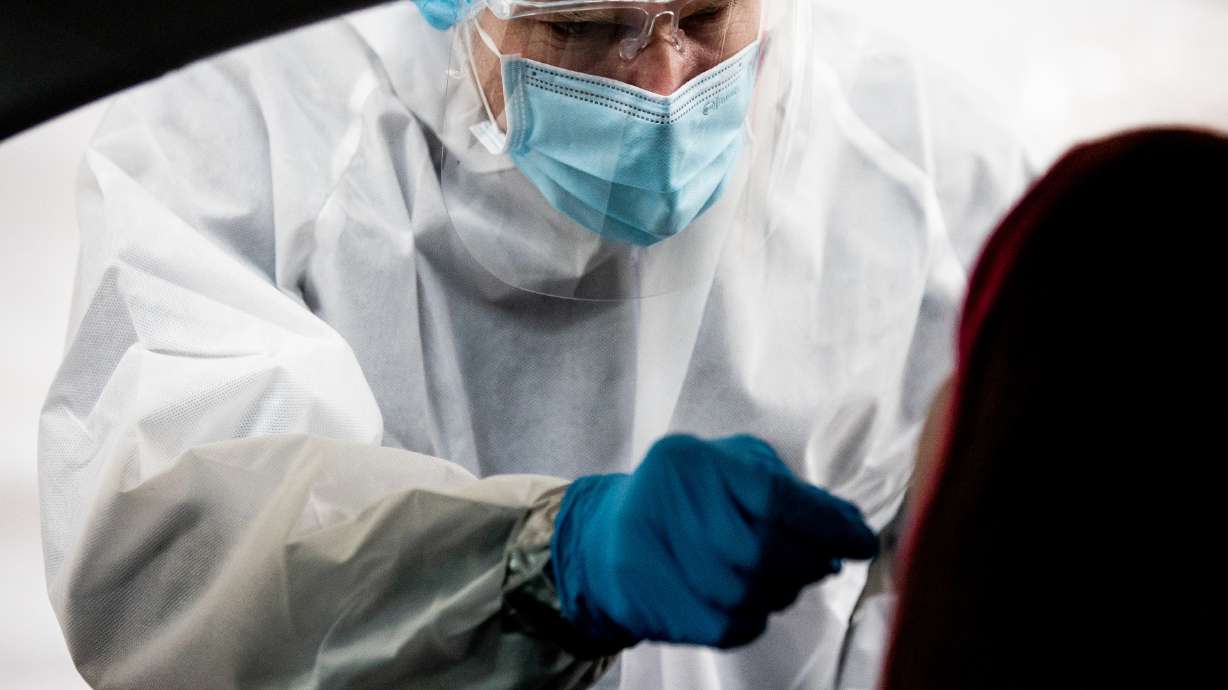Estimated read time: 4-5 minutes
This archived news story is available only for your personal, non-commercial use. Information in the story may be outdated or superseded by additional information. Reading or replaying the story in its archived form does not constitute a republication of the story.
SALT LAKE CITY — The strain of SARS-CoV-2 that emerged in the United Kingdom late last year did make it to Utah but hasn't been a major factor in recent cases, according to new data provided by the state's health department.
The Utah Department of Health has added breakdowns of three different coronavirus variants to its COVID-19 data dashboard. SARS-CoV-2 is the coronavirus that leads to COVID-19 in humans.
The data shows that, as of Thursday, there have been 33 confirmed cases of B.1.1.7, which is more commonly referred to as the "United Kingdom variant." That's just 0.4% of all SARS-CoV-2 cases tested for variants.
Twenty-eight of the variant cases were discovered in Salt Lake County, while two were discovered in Utah County, and another two were discovered in Summit County. The other variant found came from a patient in Davis County.

A majority of the cases were collected in early February.
Utah has not yet received a confirmed case of the B.1.351 (South Africa) or P.1 (Brazil) variants, which are two of the other major variants that have emerged since the COVID-19 pandemic began.
That's not to say either hasn't arrived in Utah or that they are close. Wyoming health officials reported earlier this week that they found their first case of the South Africa variant from a positive case in Teton County back in January, according to the Casper Star-Tribune.
It was previously disclosed that the U.K. variant had reached Utah. The state health department announced the first confirmed case on Jan. 15.
The different coronavirus variants have caused concerns for public health officials since they were first discovered. For example, researchers found that the U.K. variant spreads faster than the original virus first discovered in 2019. Dr. Angela Dunn, the state epidemiologist for the Utah Department of Health, said that it's led to "more severe disease" in younger populations.
Recent studies show mixed but mostly encouraging results on the COVID-19 vaccination efforts.
A study published in Nature earlier this week found that the Pfizer-BioNTech and Moderna vaccines were 10.3 to 12.4 times less effective in containing the South Africa variant. The good news is that both vaccines showed strong protection against the U.K. variant.
Another report published in the New England Journal of Medicine this week found that the Pfizer vaccine offered strong protection against the Brazil and U.K. variants. It also found the vaccine offered protection that was "robust but lower" on the South Africa variant.
That said, experts have pointed to the vaccine's success in "real world" settings. The Pfizer vaccine was determined to be 92% effective against severe disease after two shots and 62% effective after one, according to the Associated Press.
Moderna also began human testing of an adjusted version of its vaccine earlier this week, the Wall Street Journal reported. The company previously announced it would modify its vaccine over concerns of the South Africa variant.
While she cautioned that COVID-19 has proven to be "definitely unpredictable" over the past year, Dunn said Thursday there's still enough evidence that indicates that the vaccines work well against the different variants.
Dunn added that she was pleased with the speed of Utah's vaccination efforts in recent weeks. Between vaccines and methods to prevent new cases of COVID-19, there are ways to slow or stop the spread of different variants of the coronavirus.
"It's so important that when the vaccine is available to you, you get it," she said. "Also, we know how to protect ourselves against the variants, right? Masks work. Physical distancing works. Staying at home when you're ill — that all works. So let's keep using those tools until we all get vaccinated.
"We also have one of the best public health surveillance teams in the country," Dunn added. "This allows us to be able to monitor the number of variant cases in our state and understand the spread, and then get that information to you in real time. This allows you to make the best, most informed decisions to protect you and your loved ones against COVID."










